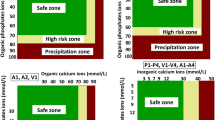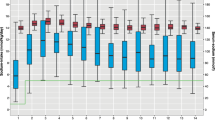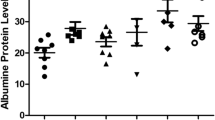Abstract
ELECTROLYTIC changes undergone by the mother will lead, both in man and animals, to similar changes in the fœtus within a few hours1,2. We have been able to establish that when gravid rats and guinea pigs are subjected to a 2–3-day period of thirsting there is serious damage of the fœtus at the end of pregnancy—a large number of stillbirths or of non-viable young3. In order to study the effects of short-term additions, Wistar rats, weighing about 200 gm., were given, on the nineteenth day of pregnancy, 1.7 m.equiv./100 gm. body-weight of sodium in a 20 per cent sodium chloride solution, or 0.8–l.5 m.equiv./100 gm. body-weight of sodium was removed by peritoneal dialysis with 0.5 per cent sodium chloride solution. Another series of animals was given 1.5 m.equiv. potassium in isotonic solution of potassium chloride, intraperitoneally. As there was rapid renal elimination of potassium, 1.0 m.equiv. potassium was administered intraperitoneally to a further series of animals after bilateral nephrectomy. At fixed periods samples of blood from the vena cava inf., of amniotic fluid and of fœtal blood from the umbilical vessels were taken from the animals, which had been anæsthetized with ether, and the sodium and potassium in the serum and amniotic fluid were determined by photometric flashes. We used lithium as a standard and utilized the emission-increasing effect of methanol4 when determining the potassium content. The animals were given neither food nor drink during this time.
This is a preview of subscription content, access via your institution
Access options
Subscribe to this journal
Receive 51 print issues and online access
$199.00 per year
only $3.90 per issue
Buy this article
- Purchase on Springer Link
- Instant access to full article PDF
Prices may be subject to local taxes which are calculated during checkout
Similar content being viewed by others
References
Winkler, H., Goetze, E., and Meinerzhagen, K., Acta biol. med. germ., 7, 349 (1961).
Dancis, J., Worth, jun., M., and Schneider, P. B., Amer. J. Physiol., 188, 535 (1957).
Battaglia, F., Prystowsky, H., Smisson, C., Hellegers, A., and Bruns, P., Pediatrics, 25, 2 (1960).
Siebert, H., and Rapoport, S., Biochem. Z., 326, 413 (1955).
Flexner, L. B., and Pohl, H. A., Amer. J. Physiol., 132, 594 (1941).
Gellhorn, A., and Flexner, L. B., Amer. J. Physiol., 136, 750 (1942).
Flexner, L. B., and Gellhorn, A., Amer. J. Obstetr., 43, 965 (1942).
Flexner, L. B., and Gellhorn, A., Amer. J. Physiol., 136, 757 (1942).
Stewart, E. L., and Welt, L. G., Amer. J. Physiol., 200, 824 (1961).
Author information
Authors and Affiliations
Rights and permissions
About this article
Cite this article
WINKLER, H., THEIL, S. & GOETZE, E. Effect of Additions of Sodium and Potassium and of Peritoneal Dialysis with a Hypotonic Solution of Sodium Chloride on the Sodium and Potassium Contents of the Maternal and Fœtal Serum and the Amniotic Fluid of Rats. Nature 194, 779–780 (1962). https://doi.org/10.1038/194779a0
Issue Date:
DOI: https://doi.org/10.1038/194779a0
Comments
By submitting a comment you agree to abide by our Terms and Community Guidelines. If you find something abusive or that does not comply with our terms or guidelines please flag it as inappropriate.



